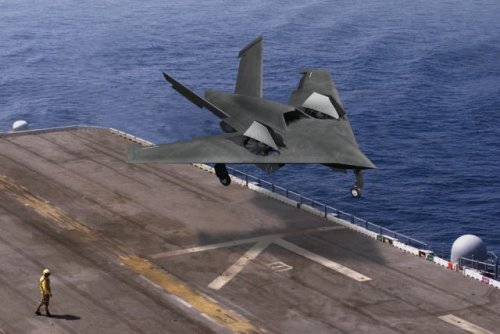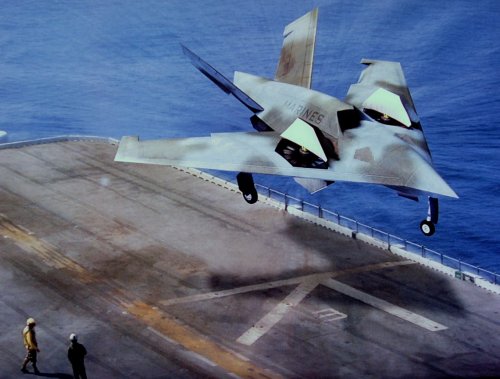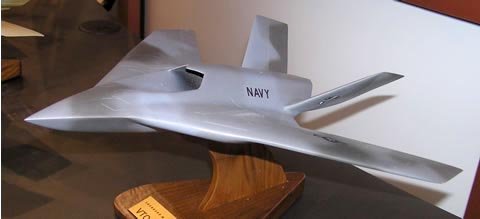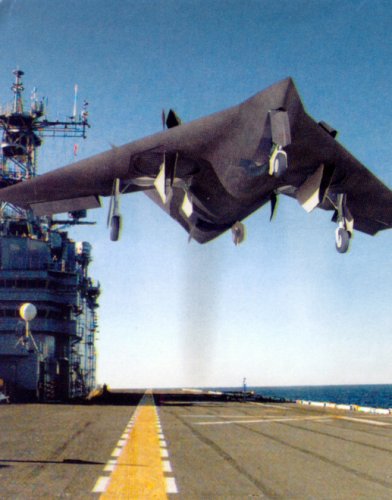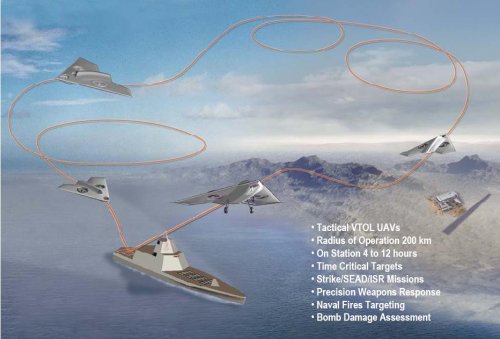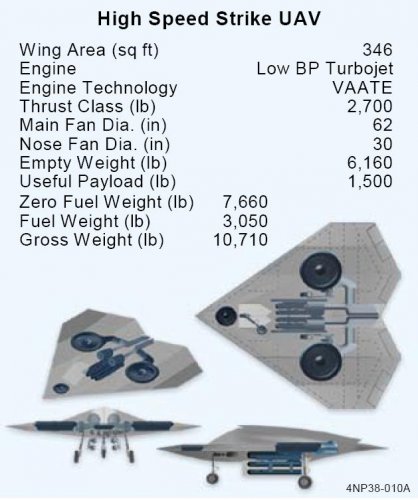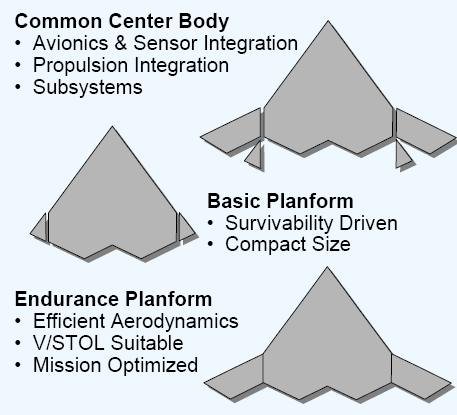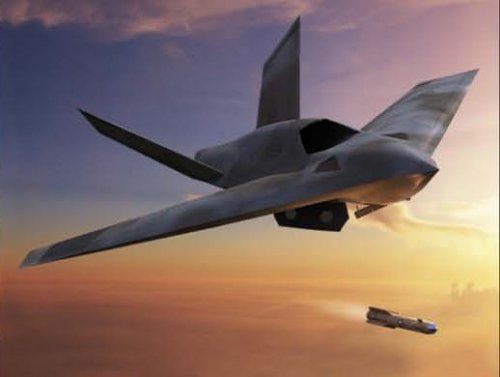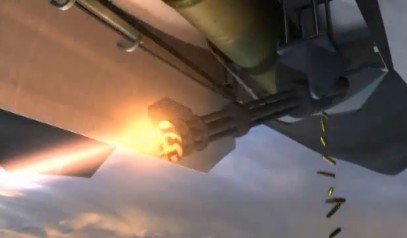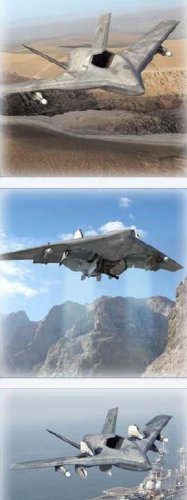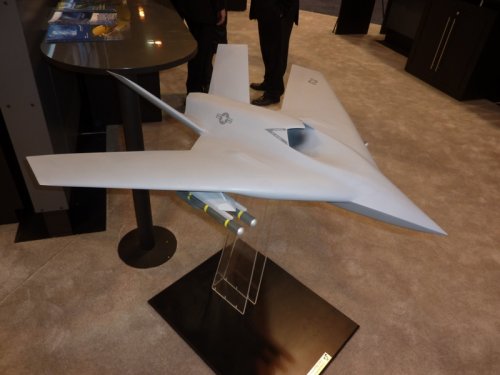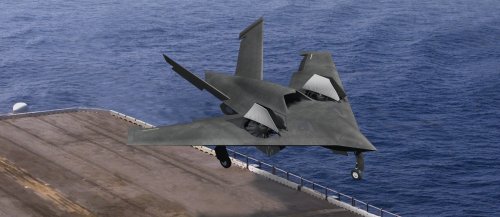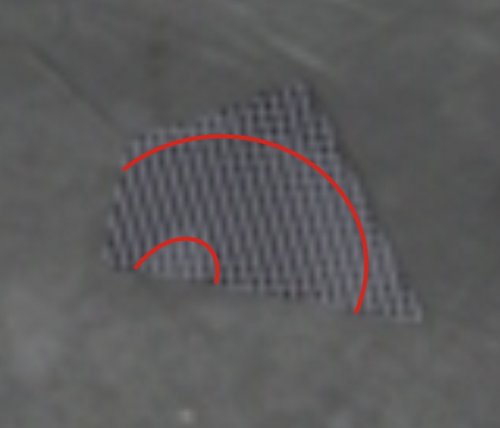You are using an out of date browser. It may not display this or other websites correctly.
You should upgrade or use an alternative browser.
You should upgrade or use an alternative browser.
Lockheed « VARIOUS » UCAS
- Thread starter CammNut
- Start date
Matej
Multiuniversal creator
KJ_Lesnick
ACCESS: Top Secret
- Joined
- 13 February 2008
- Messages
- 1,042
- Reaction score
- 104
Is this just a concept, or will it be eventually fielded by the USN?
Matej
Multiuniversal creator
- Joined
- 1 April 2006
- Messages
- 11,053
- Reaction score
- 8,513
Northrop Grumman's answer - family of lift-fan carrier based UAvs
AIAA 2004-6380
An Innovative UAV Design
Thomas C. Nietz and Scott Baber
Northrop Grumman Corporation, Unmanned Systems,
San Diego, California, 92127
AIAA 2004-6380
An Innovative UAV Design
Thomas C. Nietz and Scott Baber
Northrop Grumman Corporation, Unmanned Systems,
San Diego, California, 92127
Attachments
- Joined
- 4 May 2008
- Messages
- 2,439
- Reaction score
- 735
There is promotional video on you tube
http://www.youtube.com/watch?v=Q1fxDIIBRjE
the interesting thing is that, as well as the NGC concept, it seems designed to operate off smaller vessels, off helicopter-sized platforms.
The NGC concept seems to use tip driven lift fans using exhaust gasses from the engine. Gregory, can you confirm that?
The Lockheed concept uses deflected exhaust from the engine as a third "post" to balance the aircraft. There is a door that opens on the aft underside to let the gasses through. The deflection device is probably similar to a "switch-in" spade, similar to what the RR VTOL Medway engine used, if you know what I'm talking about. If not I'll post some diagrams I found on Flight archive.
http://www.youtube.com/watch?v=Q1fxDIIBRjE
the interesting thing is that, as well as the NGC concept, it seems designed to operate off smaller vessels, off helicopter-sized platforms.
The NGC concept seems to use tip driven lift fans using exhaust gasses from the engine. Gregory, can you confirm that?
The Lockheed concept uses deflected exhaust from the engine as a third "post" to balance the aircraft. There is a door that opens on the aft underside to let the gasses through. The deflection device is probably similar to a "switch-in" spade, similar to what the RR VTOL Medway engine used, if you know what I'm talking about. If not I'll post some diagrams I found on Flight archive.
- Joined
- 1 April 2006
- Messages
- 11,053
- Reaction score
- 8,513
Rafael said:Are there diagrams, pics, internet references of this last concept on video?
Rafa
Sure. Right on the top of this thread.
- Joined
- 1 April 2006
- Messages
- 11,053
- Reaction score
- 8,513
Lockheed Martin Introduces VARIOUS Concept UCAV
http://www.defense-update.com/products/v/various_ucav.htm
VTOL Advanced Reconnaissance Insertion Organic Unmanned System (VARIOUS), a concept of an advanced aerial recon- and support vehicle, is designed to support Special Forces and expeditionary units of marines, as an organic asset. In the next decade or later, VARIOS could assume the role envisioned for the FireScout, meeting a future naval requirement for a 3 – 4 ton ISR and close support vehicle that could vertically take off and land on an aircraft carrier, amphibious support ship or from land strips.
VARIOUS will carry our tactical reconnaissance and fire support missions, armed with an ISR package, automatic guns and missiles. The aerial vehicle is designed to be stealthy, and cooperate with manned and unmanned aerial systems and surface ships while operating autonomously. The aircraft will have a wing span of 28.5 ft, 22' length is smaller than an F35 and will be capable of operating at long to medium range, carrying a multi-spectral ISR payload and about 450 lbs of internally carried ordnance to support ground operations (maximum payload will be 1,900lbs). The aircraft will operate at ceiling of up to 20,000', flying at a maximum speed of 350 knots.
By using morphing wings, which will be able to change their camber or aspect ratio, VARIOUS will be able to cruising at a speed of 250 kt or loiter much slower over the target, maintaining a low speed of 160 kt to maximize endurance and persistence over a target area. Its vertical takeoff and landing will be provided by ducted fans embedded in the wings. VARIOUS will have some common elements shared with the Cormorant, another Skunk Works program designed to provide persistent, long range ISR and attack capabilities to US Navy Submarines. However, VARIOUS will is not positioned to compete with the F35 or unmanned combat aerial system (UCAS). The vehicle is currently in an early conceptual development phase and, if the program is pursued, VARIOUS could reach the flight demonstration phase by 2010.
(c) Defense Update
Length: 22 ft
Wingspan: 28.5 ft
Weapon load: 1900 lbs.
Maximum speed: 350 knots
Range: 1,500+ NM
Service ceiling 20,000+ ft
http://www.defense-update.com/products/v/various_ucav.htm
VTOL Advanced Reconnaissance Insertion Organic Unmanned System (VARIOUS), a concept of an advanced aerial recon- and support vehicle, is designed to support Special Forces and expeditionary units of marines, as an organic asset. In the next decade or later, VARIOS could assume the role envisioned for the FireScout, meeting a future naval requirement for a 3 – 4 ton ISR and close support vehicle that could vertically take off and land on an aircraft carrier, amphibious support ship or from land strips.
VARIOUS will carry our tactical reconnaissance and fire support missions, armed with an ISR package, automatic guns and missiles. The aerial vehicle is designed to be stealthy, and cooperate with manned and unmanned aerial systems and surface ships while operating autonomously. The aircraft will have a wing span of 28.5 ft, 22' length is smaller than an F35 and will be capable of operating at long to medium range, carrying a multi-spectral ISR payload and about 450 lbs of internally carried ordnance to support ground operations (maximum payload will be 1,900lbs). The aircraft will operate at ceiling of up to 20,000', flying at a maximum speed of 350 knots.
By using morphing wings, which will be able to change their camber or aspect ratio, VARIOUS will be able to cruising at a speed of 250 kt or loiter much slower over the target, maintaining a low speed of 160 kt to maximize endurance and persistence over a target area. Its vertical takeoff and landing will be provided by ducted fans embedded in the wings. VARIOUS will have some common elements shared with the Cormorant, another Skunk Works program designed to provide persistent, long range ISR and attack capabilities to US Navy Submarines. However, VARIOUS will is not positioned to compete with the F35 or unmanned combat aerial system (UCAS). The vehicle is currently in an early conceptual development phase and, if the program is pursued, VARIOUS could reach the flight demonstration phase by 2010.
(c) Defense Update
Length: 22 ft
Wingspan: 28.5 ft
Weapon load: 1900 lbs.
Maximum speed: 350 knots
Range: 1,500+ NM
Service ceiling 20,000+ ft
Just an FYI.
First flight tests won't happen this year and probably for a year or two more as currently the core engines have yet to be fully developed. In addition federal funding has essentially been brought to a halt by yours truly.
First flight tests won't happen this year and probably for a year or two more as currently the core engines have yet to be fully developed. In addition federal funding has essentially been brought to a halt by yours truly.
XP67_Moonbat
ACCESS: Top Secret
- Joined
- 16 January 2008
- Messages
- 2,261
- Reaction score
- 463
The intake and tail arrangement, especially from the art in the first two posts, remind me of another Lockheed concept, the Persistor.
S
sublight
Guest
Robert Gates, is that you????Statilius said:Just an FYI.
..... In addition federal funding has essentially been brought to a halt by yours truly.
Matej
Multiuniversal creator
How can the vehicle with this configuration and fan in wing have also morphing wing?
sublight said:Robert Gates, is that you????Statilius said:Just an FYI.
..... In addition federal funding has essentially been brought to a halt by yours truly.
From what I can determine Gates is in favor of UAV's in general. However, I get your jest.
Some funding may be coming through in the next month from the AirForce to allow for continued engine testing. That would be the main propulsion unit only however. It began last year but was never finished due to funding.
- Joined
- 6 August 2007
- Messages
- 3,371
- Reaction score
- 3,569
Statilius said:Some funding may be coming through in the next month from the AirForce to allow for continued engine testing. That would be the main propulsion unit only however. It began last year but was never finished due to funding.
Why would the air force be interested in the clutchless lift fan?
donnage99 said:VARIOUS is an government funded program? Since when? I've always thought it was only one of the various paper concepts Lockmart thrown on the table.
No, not all of the program, only portions. The engines involve new technology which is partly funded by the government which also makes it confidential.
Lockheed Martin Skunk Works marketing video featuring the VARIOUS released on the eve of the AUVSI convention in Denver, CO.
http://www.youtube.com/watch?v=vUpMG-KN7Pg
Source:
Trimble, Steve. "Pre-AUVSI, Skunk Works pushes VARIOUS" The DEW Line Aug, 19, 2010
http://www.flightglobal.com/blogs/the-dewline/2010/08/pre-auvsi-skunk-works-pushes-v.html
http://www.youtube.com/watch?v=vUpMG-KN7Pg
Source:
Trimble, Steve. "Pre-AUVSI, Skunk Works pushes VARIOUS" The DEW Line Aug, 19, 2010
http://www.flightglobal.com/blogs/the-dewline/2010/08/pre-auvsi-skunk-works-pushes-v.html
Steve Pace
Aviation History Writer
- Joined
- 6 January 2013
- Messages
- 2,266
- Reaction score
- 212
A way cool video!
SP
SP
- Joined
- 11 March 2006
- Messages
- 8,633
- Reaction score
- 3,489
AeroFranz said:Agreed. I am a little bit skeptical about the folding gatling gun, though
... and it seems to be fired from a hover, as the cartridges are falling down vertically.
Attachments
- Joined
- 4 May 2008
- Messages
- 2,439
- Reaction score
- 735
I hadn't caught that, good eyes.
I have no problem with an external turret on a slow-mover, like the OV-10 gunship, but the retraction mechanism seems like an impractical, costly complication. The retraction mechanism has to take the full recoil of the gun (heavier than fixed installation) and complicates aiming.
I understand this was probably done to manage signature, but why not an externally faired installation like on an RAH-66?
I have no problem with an external turret on a slow-mover, like the OV-10 gunship, but the retraction mechanism seems like an impractical, costly complication. The retraction mechanism has to take the full recoil of the gun (heavier than fixed installation) and complicates aiming.
I understand this was probably done to manage signature, but why not an externally faired installation like on an RAH-66?
I
Ian33
Guest
Cannot for the life of me see why LM are showing this again - I saw this in 2006 and 2007 and it got canned (LM said that if it got the green light test flights could begin in 2010-11 time frame).
Weird.
The F-35 of the UAV world if it does get the nod would be my first suspicion. Overweight, over complex and over politicalised.
Weird.
The F-35 of the UAV world if it does get the nod would be my first suspicion. Overweight, over complex and over politicalised.
donnage99
ACCESS: Top Secret
- Joined
- 16 June 2008
- Messages
- 1,286
- Reaction score
- 639
This thing has the chance with the Navy as much as the Air Force bringing back the f-22 production. Even if it does get green light, it will probably get cancelled after a year or 2 just like the UCAR or Comorant.
- Joined
- 17 October 2006
- Messages
- 2,354
- Reaction score
- 989
Ares post from last year may be relevant:
http://www.aviationweek.com/aw/blogs/defense/index.jsp?plckController=Blog&plckScript=blogscript&plckElementId=blogDest&plckBlogPage=BlogViewPost&plckPostId=Blog%3A27ec4a53-dcc8-42d0-bd3a-01329aef79a7Post%3A83275087-970f-4f6a-bf7d-676e36fff6d5
And it's also related to the fan-lift special ops transport design from the 1990s:
http://www.secretprojects.co.uk/forum/index.php/topic,413.msg28040.html#msg28040
Even with unconventional propulsion, though, I don't know how you are going to get a lot of endurance out of a relatively low-aspect-ratio planform performing VTO (not even STO). TOW is restricted by vertical thrust, OEW increased with the lift fan system (which gets a 4.5:1 T/W for the fan alone on the F-35), and the lift fans also eat a lot of internal volume.
http://www.aviationweek.com/aw/blogs/defense/index.jsp?plckController=Blog&plckScript=blogscript&plckElementId=blogDest&plckBlogPage=BlogViewPost&plckPostId=Blog%3A27ec4a53-dcc8-42d0-bd3a-01329aef79a7Post%3A83275087-970f-4f6a-bf7d-676e36fff6d5
And it's also related to the fan-lift special ops transport design from the 1990s:
http://www.secretprojects.co.uk/forum/index.php/topic,413.msg28040.html#msg28040
Even with unconventional propulsion, though, I don't know how you are going to get a lot of endurance out of a relatively low-aspect-ratio planform performing VTO (not even STO). TOW is restricted by vertical thrust, OEW increased with the lift fan system (which gets a 4.5:1 T/W for the fan alone on the F-35), and the lift fans also eat a lot of internal volume.
I
Ian33
Guest
- Joined
- 3 June 2006
- Messages
- 2,966
- Reaction score
- 3,236
I
Ian33
Guest
Thank you Fight.
Forgot to add other pics and the url for the download.
Forgot to add other pics and the url for the download.
Colonial-Marine
UAVs are now friend, drones are the real enemy.
- Joined
- 5 October 2009
- Messages
- 1,378
- Reaction score
- 1,136
Very interesting proposal. Interesting how it is taking off from a DDG-1000 class ship as opposed to a LHD/LHA or CVN.
When it comes to guns on a UAV, would the delay between the UAV operator and the aircraft responding to his/her commands be enough to hurt accuracy and the operator's ability to hit targets? In this case, the Navy operator is certainly closer than someone operating a UAV in Afghanistan back in the mid-west USA, but would the delay between command input and the aircraft following those commands be a problem?
When it comes to guns on a UAV, would the delay between the UAV operator and the aircraft responding to his/her commands be enough to hurt accuracy and the operator's ability to hit targets? In this case, the Navy operator is certainly closer than someone operating a UAV in Afghanistan back in the mid-west USA, but would the delay between command input and the aircraft following those commands be a problem?
- Joined
- 3 June 2006
- Messages
- 2,966
- Reaction score
- 3,236
Bill Sweetman posted some more info and a new pic at his blog.
Ares Blog - When I Grow Up I Want To Be A JSF
Ares Blog - When I Grow Up I Want To Be A JSF
Attachments
saintkatanalegacy
Little Miss Whiffologist
- Joined
- 31 March 2009
- Messages
- 718
- Reaction score
- 14
I fail to see the practicality of VTOL...
- Joined
- 2 August 2006
- Messages
- 3,206
- Reaction score
- 1,322
saintkatanalegacy said:I fail to see the practicality of VTOL...
It's difficult to land on the back of a destroyer or frigate without it. Or to be based forward with Marines. Although, based on what it may cost, I'm not sure how far forward that would be. But the Marines want an all VSTOL force, so if you are going to propose something to them, it should probably match what they're looking for in terms of mission capability.
Lockheed Martin short-deck endurance UAV concept.
Source:
http://www.aviationweek.com/aw/blogs/defense/index.jsp?plckController=Blog&plckBlogPage=BlogViewPost&newspaperUserId=27ec4a53-dcc8-42d0-bd3a-01329aef79a7&plckPostId=Blog%3a27ec4a53-dcc8-42d0-bd3a-01329aef79a7Post%3a4283bd93-68b7-4add-a5da-8031517d1503&plckScript=blogScript&plckElementId=blogDest
Source:
http://www.aviationweek.com/aw/blogs/defense/index.jsp?plckController=Blog&plckBlogPage=BlogViewPost&newspaperUserId=27ec4a53-dcc8-42d0-bd3a-01329aef79a7&plckPostId=Blog%3a27ec4a53-dcc8-42d0-bd3a-01329aef79a7Post%3a4283bd93-68b7-4add-a5da-8031517d1503&plckScript=blogScript&plckElementId=blogDest
Attachments
- Joined
- 4 May 2008
- Messages
- 2,439
- Reaction score
- 735
Auxiliary intakes for low speed operations where additional massflow is required?
BY this I mean something like the blow-in doors seen on the Harrier lip. There may be something in LO intake design that hinders low speed operation, maybe the relative thinness/sharpness of the lip makes 'turning the corner' difficult for intake air. I can only offer the B-2 as an example of LO aircraft with auxiliary doors. It is however roughly the same type of inlet as VARIOUS. Curious that the installation cannot be closed for high-speed flight, though, so maybe it's not that after all.
BY this I mean something like the blow-in doors seen on the Harrier lip. There may be something in LO intake design that hinders low speed operation, maybe the relative thinness/sharpness of the lip makes 'turning the corner' difficult for intake air. I can only offer the B-2 as an example of LO aircraft with auxiliary doors. It is however roughly the same type of inlet as VARIOUS. Curious that the installation cannot be closed for high-speed flight, though, so maybe it's not that after all.
S
sublight
Guest
Your going to get at very best 30 milliseconds of latency per 1000 miles. The encryption of the connection may generate even more. So you couldn't reasonably command the guns from CONUS on an actively "juking" target. The operator would have to pickle the bad guy and let the computer do the rest.Colonial-Marine said:When it comes to guns on a UAV, would the delay between the UAV operator and the aircraft responding to his/her commands be enough to hurt accuracy and the operator's ability to hit targets? In this case, the Navy operator is certainly closer than someone operating a UAV in Afghanistan back in the mid-west USA, but would the delay between command input and the aircraft following those commands be a problem?
Similar threads
-
2004 Northrop Grumman 'Special Purpose Unmanned Air Vehicle'
- Started by Matej
- Replies: 2
-
-
-
-
Lockheed Martin Speed Racer Concept
- Started by bring_it_on
- Replies: 18

